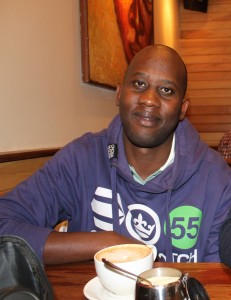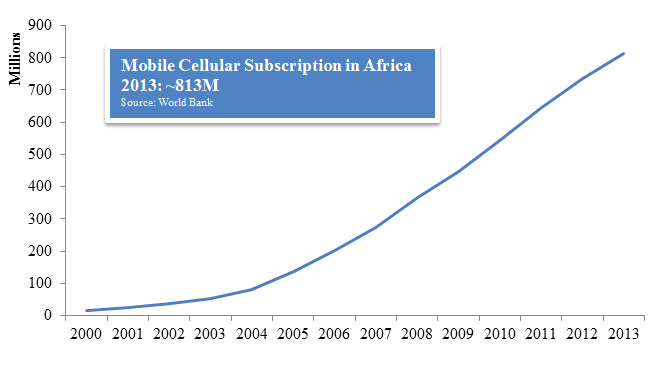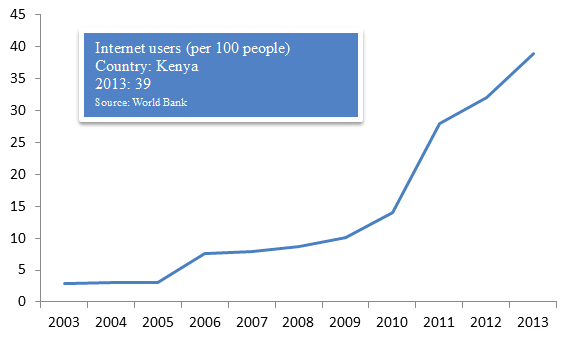The following post is from the e-book, The Most Interesting Thing About Investing in Africa, which features a series of conversations with entrepreneurs, community leaders, students, executives, and doers both home and abroad driving economic empowerment in several parts of my beloved continent of Africa.
****

Peter Nalika leads the Digital PR department at Tellem Public Relations East Africa, a digital public relations company established to help organizations communicate better on online platforms.” He was previously a Technical writer at CIO East Africa, where he reported on ICT innovations, policy development, and product reviews. During his time at CIO East Africa, he interviewed several global technology leaders including Oracle’s Mark Hurd, IBM’s Dr. Mark Dean, Microsoft’s Jean-Philippe Courtois among others.
Investment: Digital Public Relations in Kenya
SITUATION
In the 18th century, spice trading was the main economic activity around East Africa. This was before the Agrarian revolution swept through the world in the 19th century, followed by the industrial revolution in the 20th Century.
The 21st century is experiencing what is now being referred to as the technology evolution. Kenya may have struggled to simultaneously catch up on both the agrarian and Industrial revolution in the 20th Century, but the country feels quite at home when it comes to the technology revolution. Tourists from around the world stream into Kenya not only to see the wild animals, or beaches, but also to see how mobile payments are transforming everyday lifestyles in the country.
Kenya also plays home to some of the startups that are changing the way we do things in the world, by incorporating technology. Small Kenyan firms have developed software solutions that are used to collect information and coordinate response in disasters, while others are exporting automated payment systems to Kenya’s neighbors, and even as far as West Africa. In this era, information technology has become a key component in our daily lives, and I believe it has affected the way we manage our information and data. For the few years I have studied and worked in the fields of IT and Information Management, the power of information and how it empowers different organizations and society structures has stood out for me.
In the future, I see myself enabling my organization and our clients to take advantage of technology as an enabler. This is something I have envisioned long before becoming a Public Relations consultant. Four years ago, as a field reporter working with CIO East Africa, I developed an art of compiling information and news from events through information posted on Twitter, the social network. Thus, my computer and an information network became my virtual pen and paper, enabling me to source a variety of opinions of the topic in discussion from the various stakeholders. At CIO East Africa I further explored social media beyond a tool for just reporting my stories, but tried it out as a tool to distribute my published works. Like a newspaper vendor delivers a newspaper to your door, with social media, I could target my stories especially to the valuable “C” level executives. A tweet tagging them would virtually deliver my story to their computers, or phones, in front of their eyes. Further, social media enabled me to bring new business to my employer through meeting of potential advertisers and striking deals with them. Through messages on these platforms, I was able to position my publication to advertisers and come to a value proposition that suited them, and paid our bills.
I started a Digital Public Relations (PR) company to help organizations communicate better on online platforms. For so many years, many Kenyan organizations have relied on traditional PR to reach various audiences, they have invested a lot of resources (time & money) in press briefings, open-ended editorials and one on one interviews in order to pass a message to the general public. This has since then changed once the country was connected through fiber optic cables, access to the Internet became affordable, and device manufacturers brought in smart devices that allowed people to consume content from online social forums.
Since then, organizations realized the need to use social media as online concierge for their brands, because this is where most people access content. This is when I realized the need to help them strategize and communicate better on online forums. The level of Internet adoption and proliferation of affordable smart devices among Kenyans forced companies to think twice and invest on managing social communities for a two-way engagement and harness reviews about their brand and products.
ACTION
The digital world is abound with opportunities. Not only can a Mandarin speaking Chinese in Shanghai have their tweet to an English-speaking Kenyan automatically translated, resulting in conversation where it was no longer possible, but a firm can have their consumers send a tweet to machine in return for a cup of tea or even can of soda. Social Media further breaks the news cycle. No longer are the roles, such as those of the audience, news-makers and subjects cast into stone, but these can be easily reversed. Clients easily find themselves becoming the news, but with the audience playing the previously unfamiliar role news-makers, say if they like something about the client, or bad news if they are not happy with a client’s move.
It thus requires immense experience and skill to help clients walk this tight rope, and hold their hands, as they become front-runners in the digital world. My task is helping organizations not talk to their clients, but rather, to have a conversation with their clients, with the ultimate aim of having both understand each other better and forge a long-term relationship. We undertake a feasibility study, which involves learning the communication objectives of various clients on digital platforms, and then understanding how online audiences prefer to consume such content before coming up with a strategy and community management plan. We invested a lot on training on the employees to enable them understand how to deliver best practices and models that sell, manage and measure digital communications.
Relevancy is the corner-stone of social content.
But in order for organizations to be relevant online they need to understand what is happening in the online world around them. To do this we invested on a comprehensive social listening tool like Radian 6 to ensure our clients jump onto relevant online conversations. In everything we have done in terms of pulling together online monitoring tools, resources and capacity building, we try to be helpful experts by giving clients more than just managing their online communities. We have venture into business intelligence around their customers to enable our clients monitor various consumer behaviors.
This kind of information has encouraged participatory conversations between the client and online communities which has built engagement among these two parties and given the client’s organization a personal side. However, despite the time and effort we have taken to advice organizations on social forums, there is still some sort of resistance. Most organizations are not willing to engage on social media, they don’t understand the importance of having a level of approachability social platforms give to a brand. This has been a challenge so far in addition to quantifying the return on investment when a client or an organization engages into digital communication.
RESULT
Through various engagements, organizations have restructured how they present their messaging to various online audiences. While these audiences have grown to be passive recipients of online messaging, communities have sprout up and created value by connecting members to each other and not just the brand. We have designed remarkable strategies for brands, and even counties in the Kenyan government, the social media strategies have enabled these organizations to have some sort of unity by harnessing the power of social capital and a high purpose among communities. Measurement planning was also one of our outcomes, it is a necessary element of social strategy, and most of our strategies are deeply rooted in measurement planning that is evaluated against client’s marketing and business objectives.
As a company, our objective is to marry traditional PR and digital integration, being a small outfit we started by assisting our clients to creatively use PR and media engagements and we are determined to build the company into a global player. My goal is to have all our existing clients realize and achieve more value through digital platforms. Digital platforms will enable these clients establish personal relationships with their clients and fans, something that is now possible with little effort. Even as a consultant that is highly regarded by my clients, akin to a captain guiding a ship in the high seas, social media and the digital world have also been, and remains a learning experience for my team and me.
To keep up to date with the latest tricks and best practices, my team and I have attended various digital communication training, both in-house and from our affiliates in South Africa. Going to the future, I am aiming to turn social media from more than just being a communication and relationship tool for my clients, but make the same a valuable business insight tool. Through analytics and business intelligence, I aim to provide insight into Kenyan businesses, such that, based on what people are saying online, they can predict the impact of the same on their brand, and be in a position to favorably react to the same, resulting in a positive impact to the business.
Investment: Digital Public Relations in Kenya
L = 50
I = 25
C = 30
BUSINESS IDEA METRIC (BIM): 105
You can connect with Peter on Twitter: @peternalika


